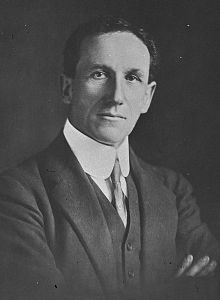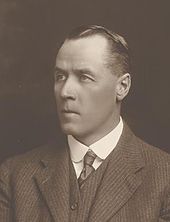‘Divided sunburnt country: Australia 1916-18 (11): The Case for Universal Service‘, Honest History, 8 September 2016
The Divided Sunburnt Country series
When Prime Minister WM Hughes announced the first conscription referendum there was already plenty of literature in circulation making the case for and against. The Case for Universal Service was a pamphlet published in September 1915 by the Universal Service League, based in Sydney and strongest in New South Wales, and led by a number of distinguished citizens of the day.
 WA Holman (Wikipedia)
WA Holman (Wikipedia)
Joan Beaumont (Broken Nation) says this of the League:
Modelled on the British National Service League and driven by the Round Table— a movement devoted to imperial collaboration— the USL boasted support from across the political spectrum. Its members included Holman and a number of his ministers, leading figures in the Liberal opposition, major church and business leaders, the lord mayor of Sydney, prominent academics, the president of the National Council of Women and even some union leaders.
Its manifesto, published on 11 September, demanded that the federal government move to introduce legislation to allow conscription for overseas service. As the USL saw it, the principle of compulsory military service was already embodied in the Defence Act so far as home defence was concerned. Logically it should be extended to include the defence of the empire, since “today Australia is being defended in the fields of Flanders and on the hills of Gallipoli. If she is to be saved at all it must be there.” (Kindle Locations 2673-80)
The key objectives of the League were
-
To advocate the adoption for the period of the present war of the principle of universal compulsory service at home or abroad, in the battlefield or elsewhere; and to support the Government in providing at the earliest possible moment such organisation as is necessary to secure the wise and just application of this principle.
-
To secure the passage of legislation for the above purposes; and to assure the Federal Government that such legislation will command the loyal support of the people of the Commonwealth.
 JG Latham (Wikipedia)
JG Latham (Wikipedia)
The League’s pamphlet covered the following main topics: the issues for Australia; how Germany would treat us; the benefits of compulsory service; countering objections to compulsory service. Much of the pamphlet was dry and legalistic but rhetoric took over towards the end:
It is indeed a solemn and terrible crisis, and every day we are more loudly warned to have our loins girt, and our swords sharp, and all things ready. If we are to shun the fate of those great civilisations in the past that were swept away by brute violence, we must bestir ourselves at once; for never had any State so intelligent and well-equipped, so resolute and forceful, so remorseless and unscrupulous a foe as “the blonde Teuton beast”—such is the description given of the German by a famous leader of German thought. To defeat the attack, or even hold it in check, we must put our backs and brains and wills into the struggle as we have not hitherto done.
The German thinker was Nietzsche. The pamphlet concluded with an extract from a letter from a soldier at Gallipoli.
Beaumont notes that the League had taken a break from pro-conscription agitation during the 1915 War Census – many people saw the Census as a back-door route to conscription – but then
swung back into action when enlistments declined in early 1916 after peaking at 22,000 in January. It was joined by the Australian Natives Association, a nationalistic friendly society started in 1871, which also lobbied for the government “to take immediate steps to fully utilise the services of every citizen and the resources of the Commonwealth”. (Kindle Locations 3829-32)
The League’s President was Professor Edgeworth David and its Executive Committee and office-holders included WA Holman, premier of New South Wales, CG Wade, former premier of New South Wales, JC Watson, former prime minister, educationist Meredith Atkinson, businessman Charles Lloyd Jones, law professor JB Peden, barrister TR Bavin and, in Victoria, barrister JG Latham.
8 September 2016


Leave a Reply
You must be logged in to post a comment.